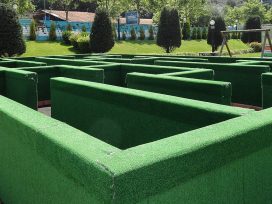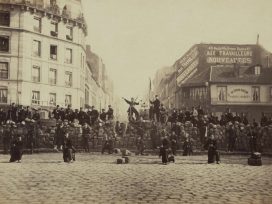A free captive
Writing open letters of protest, quoting Václav Havel, led to incarceration for a young Chinese woman. How deep do comparisons between communist China today and Czechoslovakia of the 1970s and 1980s run? And what can Jan Patočka’s thoughts on evading passivity tell us about the compulsion for dissident acts?
I.
When I visited China in the mid 2010s, it was as if I had found myself back in Czechoslovakia during the period of normalization. Rapid growth had led to industrial pollution and environmental devastation, with urbanization reaching unimaginable dimensions. I met people connected with the editor Xu Zhiyuan, the publisher of DanDu, an anthology of dissident texts commenting on the police state. It was as if a cycle were coming to an end and the world was spinning in a maelstrom of censorship and self-censorship. I was deeply ashamed that in Czechia, my country, even politicians perceive China as a stabilized, harmonious society.
Many indications can give us a glimpse into the future, whether in a family or state. And I asked myself what I was witnessing, what sort of manipulation and dictatorship was it this time. The fates of the Europeans I observed in China were those of Europe.
European individualists are responding to China just as they once did to the Soviet Union; they don’t want to see the terror. André Gide and Jean-Paul Sartre lavished giddy praise on Stalin’s criminal construct, claiming that Soviet cows produced more milk than French cows. Even the Czech journalist Julius Fučík saw the Soviet Union as a country where the future was already history.
When Gide and Sartre visited the land of fear to see everything for themselves, they looked around through veiled eyes, delivering their reports to the world. Gide wrote of a great new joy that inevitably also involved small, unpleasant mistakes. In 1936 in Moscow he saw a city living a normal life even as the show trials and the years of genocide and terror had already begun. This minor demystification was held against him; the Czech poet Stanislav Kostka Neumann, a man who had never been to the Soviet Union, swiftly composed a pamphlet called Anti-Gide. In the 1950s Sartre was still describing Moscow as a city living a normal life.
People let themselves be blinded by the romance of Fidel Castro and Che Guevara. Yves Montand was a fervent communist, but he drove a Ferrari and refused to acknowledge Stalin’s purges and show trials until 1968. It is always the same. Decades later Western European leftists continued to visit Soviet countries: in 1970s Czechoslovakia Václav Havel may have been in prison, but you could get beer for practically nothing; in the 1980s people went to small, independent theatres and said how nice it all was, so much cheap beer, so much fun.
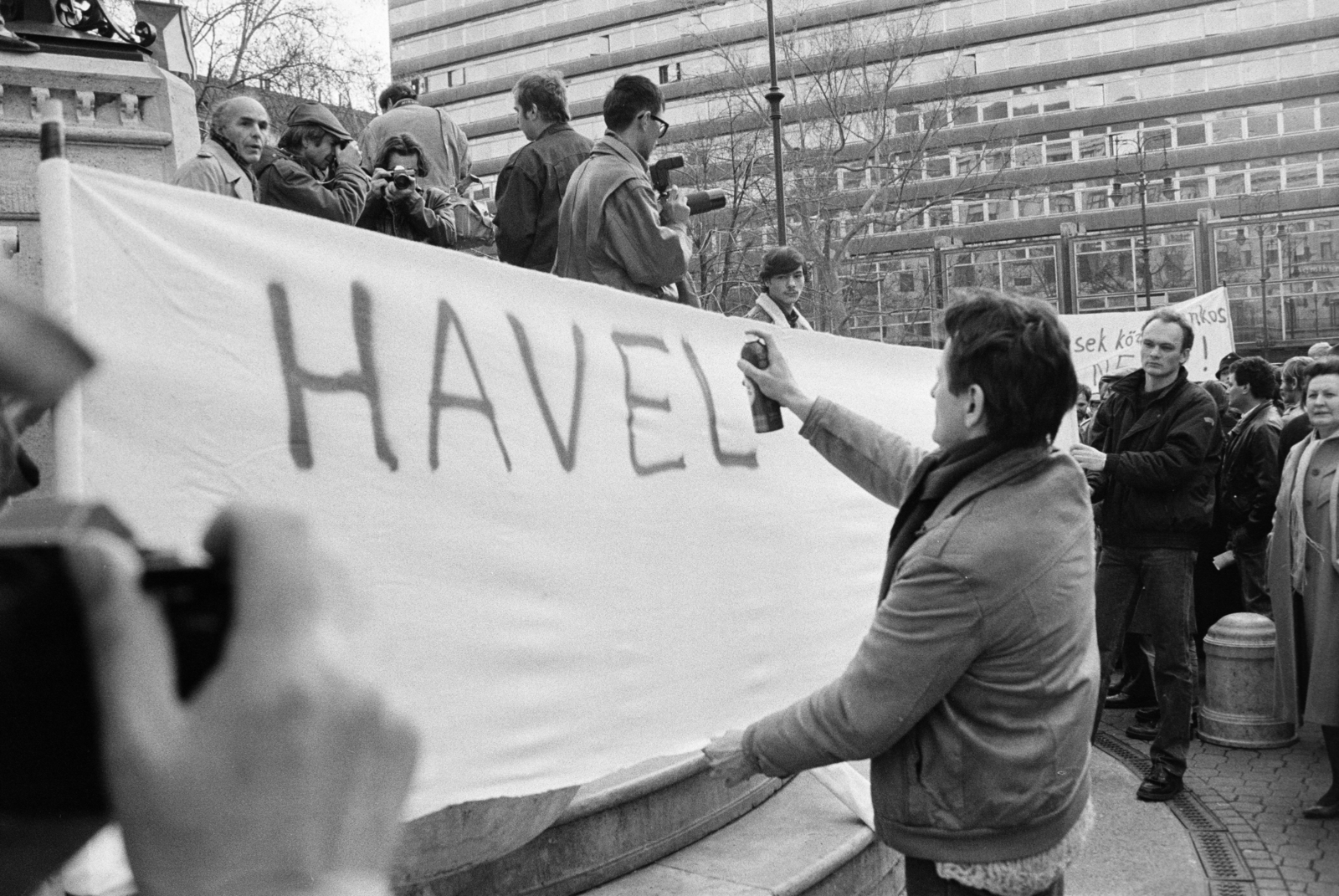
A protest rally in Budapest for the release of Vaclav Havel on 2 March 1989. Image by Vimola Károly via Fortepan
And now people are traveling to Beijing. Much can be read from surface appearances but not enough. The twentieth century was an excellent lesson in top-down propaganda and deception. The twenty-first just needed to beef up its technical know-how; large groups of people can reliably be controlled by technology.
Politicians in China consolidate their power by reaching for Stalin’s tried-and-tested tools from the Soviet thirties or those from the Eastern European fifties. They eliminate rivals in senior positions, ministers and civil servants, accusing them of corruption or moral degeneracy; anyone can disappear from one day to the next. In the provinces there are work and re-education camps. The tsarist policy that Stalin developed to such a state of perfection go by the name of ‘world domination’. Pragmatism joins hands with an ideology confident in its historical mission: emulating Stalinism is equivalent to state terrorism; communist elites anticipate high death tolls. It’s all about strength – that’s just how it is. Not everything enjoyable is swallowed up by the totality, but it engulfs the natural order of things. In China you have to be able to read not just between the lines but between lives. The mysterious regime of the secret services is as spotless as Stalinist snow.
The economy has been militarized. Buying real estate or saving money are what Chinese people do abroad – the only place their private property is safe. At home they are at the mercy of the state, which might take their savings or confiscate their house. They send their children overseas in the hope of obtaining dual citizenship for them; officially, they can only have Chinese citizenship, but there are no checks. They dream of their country being a superpower. Economic success is not enough; China is arming itself, cosying up to the military. Just like Hitler’s Germany, China provokes conflicts and engages in skirmishes at its borders, so its politicians can later explain pleasantly that they had no choice but to arm themselves and go on the defensive.
What binds a nation most strongly is an external enemy. Whatever the circumstances, the Chinese Communist Party always gives the impression that it is defending and protecting its people against invaders. Li Zhisui, Mao’s personal doctor, recalls the words of his dear patient, so devoted to the Soviet Union, who on the one hand had the greatest respect for Comrade Stalin, and on the other competed fiercely with him, rejoicing maliciously over every tiny thing that weakened his rival. Mao thought that his comrade misunderstood the situation, expecting China to put to sea and take Taiwan. He disagreed: Taiwan’s ongoing anguish helped maintain internal unity. On an imaginary world map of tyrannies, China holds first place due to the harmonious perfection of its system.
All the talk I heard in China was communist with vocabulary resembling that of my childhood. It is a secret society. Hardly anyone can penetrate its heart. There is a virtual life and a real life, and it isn’t easy to distinguish between the two. Brainwashed, xenophobic societies all over the world react in the same way – they hate anything different.
Many politicians now make compromises with China’s leaders just as quickly as the Czechoslovakians did with Soviet occupiers after 1968. Most tend to forget yesterday’s ideals in a flash, anyway. Eastern European countries that didn’t want to be satellites of the Soviet Union do want to be a Chinese subsidiary: they voluntarily accept today’s economic occupation. Back then, everybody knew who was on which team in the game of East versus West. These days, the teams have gotten mixed up.
The atmosphere in Beijing resembles the mood in 1970s Prague; small islands of self-awareness and self-liberation are emerging, even though external ties have been brutally ripped apart. At that time in Prague, there was a new generation growing up that had not been traumatized by Nazi or Soviet occupation.
II.
In 2017 a young woman who was studying medicine in Beijing wrote open letters to the National People’s Congress, the president and the premier. She called for democratization and uncensored books and journals – for a fairer China – but did not want to get involved in political debate. The young Chinese woman’s love for her country was otherwise unshakeable and uncritical. She died in prison.
Those letters were her life’s manifesto, but, above all, they were an act of provocative hope. Achieving change means insisting on small, trivial things such as the publication of a certain book or journal, the salvation of an old house from dilapidation – not going along with the rules imposed from above and constantly defending yourself. Dissidents around the world pepper their courageous letters with quotes from Václav Havel, as did this young woman.
In 1978 Havel wrote a long open letter to the communist president, Dr. Gustáv Husák, who later sent Havel to prison. He spent eleven years there. His writing was intended as a form of self-realization. The aim was to demonstrate a new, healthy pattern of behaviour: to avoid gruelling polemics where concrete things fall by the wayside; to fight exclusively and without exception for those concrete things, without yielding, to the bitter end.
The young woman quoted some lines from Havel that echo the arguments of the philosopher Jan Patočka. He shared Patočka’s view that we shouldn’t take a passive role in the history written by the victors, that we shouldn’t always wait for them to act. And Havel wanted to regain, at least in part, sovereignty over himself as an active subject. His criticism of Milan Kundera’s view on the fate of the nation is relevant here. Kundera – and he was not alone – claimed that the Soviet occupation and the subsequent period of adjustment in Czechoslovakia were simply the nation’s lot: as if the Soviets had come not to impose their idea of order on their rebellious territory but to fulfil the ancient destiny of the Czechs, as if our state representatives had to sign the Moscow Protocol for that reason alone. Havel didn’t think historical parallels and reflections on the meaning of our history were inherently wrong, but he disliked how they were a distraction from the living, human, moral and political problems of the time – in other words from the task of taking our history into our own hands and giving it meaning that way.
Havel believed Kundera was a prisoner of his own scepticism and elitism, and, therefore, found it hard to admit that an act of bravery from time to time can be good for citizens – even if it means making a fool of themselves. Havel’s personal experience with communism meant he was well able to understand Kundera’s panicked fear of absurdity and pathos. But fear prevented Kundera from grasping the mysterious ambiguity of human behaviour under totalitarianism. That same fear now blinds Europeans to life under totalitarian conditions.
The case of the young Chinese woman is connected to others. She thought she was prepared for arrest and imprisonment. Confucius said that the true mistake is to do something wrong and not correct it. She hoped to be able to make the most of prison; she would read, write, study. Havel also wrote while in prison – in his case, letters to his wife Olga.
But Havel was world famous. The young woman had no supporters, nobody knew about her. Those who did, tried their hardest to conceal any connection to her. The truth of her suggestions was alarming.
At the top of the pyramid is the state government. It gagged the young Chinese woman; the Party has no interest in virtue. The only reason the mysterious letter writer was taken seriously at all was because she wasn’t easily frightened. There was no collective or group behind her. She didn’t want to claim any personal merit. She just sent out the word. Havel’s words may have given her letters an additional moral dimension, but their naïve use allowed the authorities to respond with a comprehensive counterattack. The Chinese Communist Party learnt from the Communist Party of Czechoslovakia’s misjudgement, banning the young literary magazine Tvář in the middle of the 1960s: the decision faced criticism from unexpected quarters at the writers’ congress in the spring of 1968 – from radicalized, progressive communists.
The investigators of the Chinese Communist Party’s Central Commission for Discipline Inspection have unimaginable powers. They are as omnipotent as the Chekists in Stalin’s USSR, who drew up their own lists of enemies. They raid large firms and senior government offices under the guise of combating corruption or immorality. Violations committed by party factions at a national level provide an ideal pretext for witch hunts. The Chinese president grants the disciplinary commission unimaginable powers, including shuanggui, the twin-track justice system. Internationally acclaimed artist Ai Weiwei was accused of not paying his taxes and had to flee. Others are less fortunate. The Communist Party needs to keep its hands clean for the sake of foreign investors, so everything is done in the strictest secrecy: functionaries and common civil servants vanish, their bodies suspected of ending up in closed institutions. Nobody dares to ask questions.
The young woman was not looking for a global political confrontation. Her battle was a private attempt not to drown in compromise. Now, there’s no way back – not even to pointless, covert discussions about what must be sacrificed to preserve something. While in prison, awaiting her trial, she was expelled from university. Her parents’ house was ransacked: personal belongings, including the family piano, computers, mobile phones, textbooks and notes for her thesis on thyroid function, all seized; no evidence of unlawful behaviour was found. Her money was confiscated and bank accounts closed. Her parents were penitent. They distanced themselves from their daughter. Anyone who supported her financially or verbally would risk the same fate.
The young Chinese woman stood alone, encumbered by freedom, burdened by her vision of a dignified, worthwhile life, a hopeless endeavour. Good things generally begin with hopeless endeavours. She wrote a letter like Havel. It freed her internally, catapulting her into mental autonomy. Then she experienced the paradoxical despair of being newly released into the absurdity of living as a free captive. What kind of freedom is it? She was excluded from everywhere, officially branded an enemy.
Havel was allowed to watch television in prison. He read newspapers and a restricted number of books: multivolume editions of Marx, Engels, Lenin and Mao. On the evening news, he watched the furious smear campaign against Charter 77 in amazement. He understood that a trap was being laid for him; he was forced to apologize for one of his pleas for clemency. Parts of the apology, distorted and taken out of context, were later published. The words were intended to vilify him, to position him alone against the world – a coward and traitor to all. Strategies do not change. Terrorist states know that psychological means are the best way to demoralize opponents: defamation, newspaper articles, mass hysteria, propaganda.
The young Chinese woman was just an anonymous cog in the machine; nobody demanded an apology from her. And yet Jan Patočka and Václav Havel spent their entire lives reiterating that if anything can influence our national destiny, it is above all how we fulfil our human duties. Even purely moral acts, with no hope of any immediate or visible political effect, can be gradually and indirectly politicized over time. It is worthwhile to act courageously as a citizen.
Havel always remembered something Patočka once said: ‘the real test of a man is not how well he plays the role he has invented for himself, but how well he plays the role that destiny assigned to him.’ Patočka’s cultural, political and civic engagement led to his dissidence. Spiritual renewal, which he called ‘existential revolution’, is an undertaking faced by everybody, at every moment. We all can and must do something, and do it here and now. We cannot wait for anybody to do it for us.
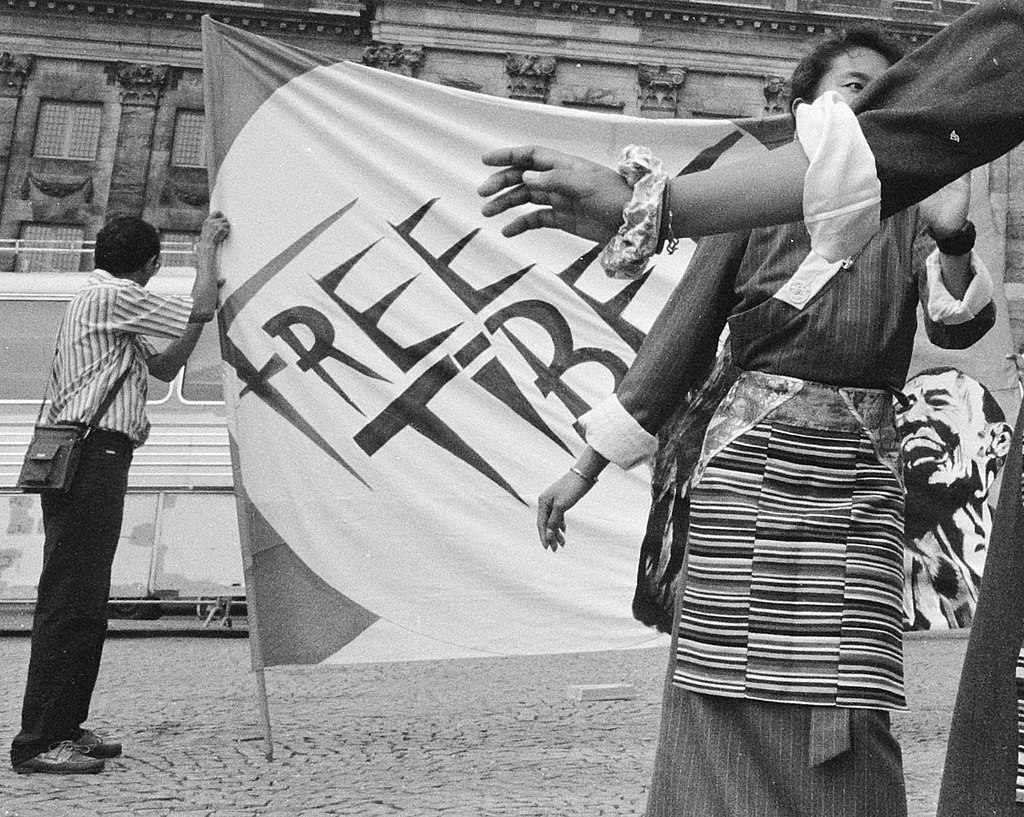
Protest in Amsterdam by against the Chinese occupation of Tibet in 1989. Image by Rob Bogaerts, via Anefo and Wikimedia commons.
III.
Collective falsehoods cannot be eliminated. In August 1968 it was more than Soviet tanks that moved into Prague without permission – it was an occupation. Russia still describes it as liberation in 2023; brainwashed soldiers thought they were protecting Prague against the aggression of West German revanchists. They believed, and still believe today, that they saved humanity from a Third World War.
In January 1969 Jan Palach immolated himself in one of Prague’s public squares in protest against the Soviet occupation. The student set himself on fire, just as Tibetan monks had done in protest against Chinese genocide. Palach’s manner of death, difficult to explain under other circumstances, was immediately understood as a powerful, highly symbolic expression of the spirit of the time. Everyone recognized the desperate need for some spectacular act; when everything else had failed, only radical action remained.
The Chinese know why the region’s communist regimes and their leaders fell in 1989. They understand that the majority didn’t dream of democracy or freedom but of materialism – life was better in the West. Chinese ‘communism’ includes private enterprise in a communist system – squaring the circle.
Liberal premier Zhao Ziyang and his fate after 1989 recall that of the Czechoslovakian leader Alexander Dubček after 1968. When Ziyang spoke out against the use of force in Tiananmen Square, he was relieved of duties. He saved face by slamming his fist on the table. But Ziyang was held for years in his old family estate, remaining out of sight, in disgrace, while the Communist Party investigated his case. Dubček, acceptable to both reformers and conservative communists, delivering his reforms on democratization and the abolition of censorship with a shy smile, became a symbol of the Prague Spring. Yet, in April 1969, Gustáv Husák took Dubček’s place, demoting him to chairman of the Federal Assembly of Czechoslovakia. The apparatchik in him had waited until the autumn of 1969 before being shunted off to Turkey as ambassador. He was kept out of the public eye in the hope he would emigrate to Sweden at Prime Minister Olof Palme’s invitation; in that case, the familiar story of an agent in the West’s pay would have been wheeled out. After his return from Turkey, the functionary worked as a mechanic and fleet manager at the state forestry agency in Bratislava. He remained under surveillance at his old family residence, a villa in the city. He wrote letters to Husák and the Italian Communist Party, awaiting his fate in his living room.
Dubček was not vocal enough after August 1968. He didn’t bang on the table or resign. He lost face. When surrounded by tanks, he just smiled unassumingly as if it was nothing. His friendly face later rubbed off on the period of normalization; people need so little, but that little is everything.
The term ‘counterrevolution’ was already being used in Moscow in mid-March 1968, even though the Czechoslovakian politicians of the Prague Spring weren’t planning anything controversial. On the contrary, they wanted to strengthen socialism by giving it a ‘human face’. No communist leader had ever enjoyed as much support as Dubček; Eastern European and Soviet Union politicians were confused. People voluntarily paraded, waving banners, calling for democracy.
Learning from the Czech experiment, China deduced that socialism cannot have a human face. It can only be strengthened by economic success. If people had not hankered after scarce goods and feared that customs officers would take their purchases away at the border, they wouldn’t have taken to the streets. The word ‘Ostalgie’ is often displayed on the walls of shops in the former German Democratic Republic; frustrated East Germans think fondly of the past, as if it wasn’t so bad after all. But ‘nostalgia’ is a sentimental distortion of reality, nothing more. The Nazis in East Germany wore the cloak of communism and said, like their counterparts in Austria, that under Hitler it wasn’t all bad. Countries that have experienced a temporary historical ‘defeat’ think along similar lines, and right-wing radicals can be found in their streets.
Only the mindset appears to change. Every country carries its past under its skin. It’s not just politicians that want to avoid provoking the Chinese superpower. Everybody is seeking ‘détente’ with a ‘stabilized’ China, exactly as they sought ‘détente’ with the Soviet Union, that other ‘stabilized’ state in the last century. It’s a naïve and narrow-mindedly suicidal form of ‘détente’: the moral and political atmosphere is like the smog that Eastern European countries inhaled and that is still, along with slimy phlegm, being expelled from their lungs today. From 1945 to 1989, Czechoslovakia was saturated in Soviet agents. The General Secretary of the USSR found out about signs of agitation before the national president, and the military was organized as a satellite army for decades. Czechoslovakia’s entire society was a satellite society.
And what of today? Is Czechia still a satellite society? It’s as if its citizens cannot live in freedom and independence, when actions such as that of former President Miloš Zeman continue, inviting Russian and Chinese advisors to Prague Castle.
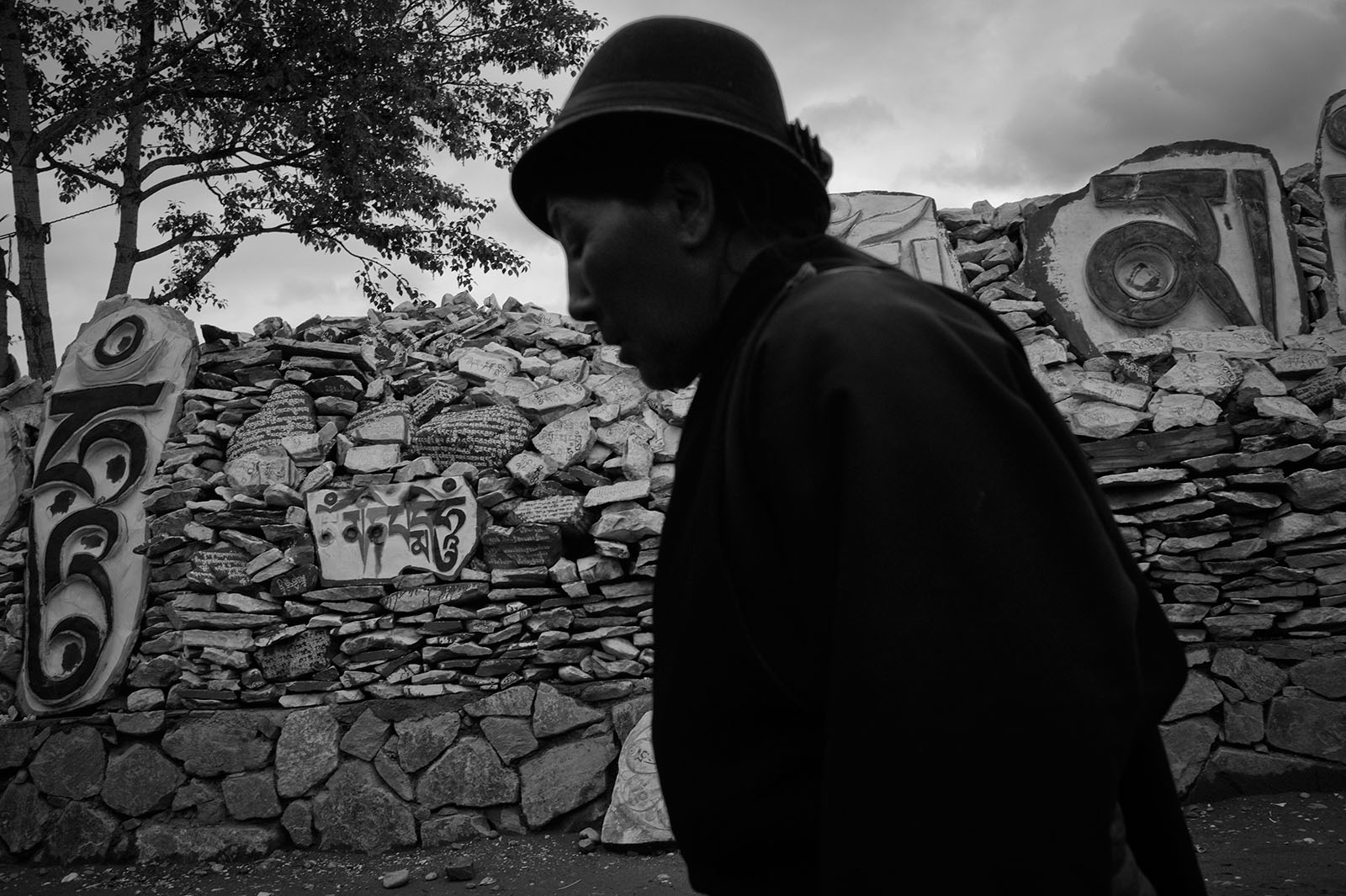
Image taken in the Qinghai province by xingtu via Flickr.
IV.
The trial involving the rock band Plastic People of the Universe in 1976 unexpectedly turned despondent people, including many banned scientists, artists and politicians, into a dissident movement. People gathered around Havel to demonstrate. Civic bravery prevailed against the representatives of communist authority and totalitarian despotism. Patočka said it was clear that terror had been unleashed; preparations for what became Charter 77 began on the day of the band’s trial, a symbol of state brutality. The philosopher said the problem was that a government was in power that nobody had elected and nobody liked, that the largest party was always a sort of conspiracy against the rest of the nation, and that this all-powerful government decided everything. But he also said that, in countries like ours, people make use of a weapon that may not be able to get rid of the government but can hurt it: the weapon of speech. Freely circulating words travel from person to person and awaken long-submerged capabilities and desires: the desire for the freedom and dignity of a human being whose fundamental rights are not just recognized but also guaranteed, for example.
Authors, philosophers, politicians and scientists, banned from being published post-1968, were working as labourers, lorry drivers, window cleaners. Wherever culture is silenced, human community perishes. Patočka understood that there is no crueller tyranny than that exercised under the guise of law and with the appearance of justice, because it drowns its unfortunate victims on the very rafts on which they hope to save themselves.
Things changed when the Czechoslovakian government added its signature to the international Helsinki Accords in 1975. By doing so, it committed, among other things, to ‘facilitate the freer and wider dissemination of information of all kinds’. It also agreed that children shouldn’t be disadvantaged by their parents’ political views, and that they should have the opportunity to attend lower and upper secondary schools when suitable.
After several years of increasing depression, 1977 brought new momentum. Only in an environment without prohibitions and restrictions can people’s hidden creative qualities be released. Such an environment was generally not available. The young people from the rock band were in prison because they had played their music. Patočka did not like the ‘kids’ music’, with its electronic effects and added visuals, but, after the trial, he got involved. He couldn’t have done otherwise, and he helped them. It was a matter of principle, of freedom. It was about making sure young Czech musicians could play; it is about making sure a young Chinese woman can express her opinion.
Charter 77 was founded as a political movement of dissidents. Patočka decided to not always wait for others to act but to do something himself, and, for a change, to encourage other people to deal with something other than that which was originally planned. The rule of law is like daily bread, like water to drink and air to breathe. The best thing about democracy is that only it can ensure the rule of law. Freedom is for society what health is for the individual. The slogan ‘Today Plastic People of the Universe, tomorrow us!’ summed up the mood of the people.
V.
In the 1960s it was the old communist dogmatists that were confronted by the communist anti-dogmatists of the Prague Spring. In China all communists are anti-dogmatists. Restaurants only come to life in the evenings: the lights go on, the staff wake up and yawn, young people clutching mobile phones wolf down their food, drunkards knock back more shots, in the corner a woman practices K-Pop dance moves; everyone is doing their own thing, nobody is interested in anyone else, their bodies possessed by technology.
Our world is different, based on the textbook example of Central Europe’s explosion of bravery following the Plastic People of the Universe. But it had nothing to do with bravery in actual fact. The band stumbled into the dissident ghetto by chance thanks to the drafters and first signatories of what became Charter 77: Václav Havel, Jan Patočka and Jiři Hájek. The band was never interested in politics. People grew out of their stupefied admiration. The group was later invited to Beijing by the Czech Embassy. They were asked to play in a communist punk club. When the organizers mentioned China, they declined. But when they mentioned the fee, an eager answer came back: ‘When?’ All around the world, people are being taken in by the new totalitarianism without batting an eye. The only thing that matters is the size of the offer. Stalin’s message to the Soviet satellite states was that there should be no mention of Western Allies. Stalin created Homo Sovieticus, a Soviet conformist who is still alive and well in Eastern Europe.
Many people nowadays are impressed by the Chinese model: an economically successful, capitalist-communist police state that promises affluence. But Chinese prosperity has its own purpose: to avoid democracy rather than support it. Reforms are implemented to keep communism alive. They are targeted at democracy. The system in China now is the lovechild of the worst of capitalism and the worst of communism.
Nobody will sign a petition. Sure, in the last century, petitions might have been useful, so the mantra goes, but these days nobody reads them – they just irritate the powerful unnecessarily, provoke authorities; a truly unnecessary display, protests by nonconformists change nothing. Milan Kundera was right. Dissidents are always outside of reality: officially, there is no Tibet, no Uyghur minority, no Falun Gong, a religious-political movement with more members than the Communist Party, all blind in both eyes.
Books by Havel can be found in Beijing these days but not always – it varies. When the Party decides to take a harder line, Havel lands back on the blacklist of strictly forbidden authors. He is idolized by young Chinese dissidents. They worship him just like the East German and Polish intellectuals whose manifestos he inspired back in the day. His concepts of living in truth and the power of the powerless, of the need for national revival and existential revolution, are known around the world. Hope is concentrated in his person, because he not only kept control of the story of his books until the end but also of the story of his life. In the last absurd chapter and final twist, he became president of the country that had gagged him, banned him from working and repeatedly imprisoned him.
The masses in China don’t understand what dissidents are good for. What chance does an egg have against a millstone? They do not know the word dissent and, just like the illiterates carted off to Tibet, they are unaware of its context and simply chase after their lucky rice bowl. Anyone who thinks communism means equality should go to China. The cities of Beijing and Shanghai give a false impression: the majority of the country is poor; people flock to the cities. Urbanites do not see villagers as real people; simply being poor makes you one-third bad already, while wealth hides a multitude of sins.
China’s contemporary communists think Confucianism has lost its religious power. For that reason, Confucian values are held in high esteem: to maintain calm among subjects who are afraid of the rapid pace of change, the new materialism, the generation abyss, as if entire life stages had been skipped. Nothing can be skipped. China’s politicians put Confucian morals to use: obedience to authority and family ties are the foundation of moral values; both serve to explain the economic upturn. Obedience is paid to the ruler, whether Emperors of the past or the Communist Party. Obedience is in the country’s bones. China has been shaped by religion and Confucian ethics for more than two thousand years. For precisely that reason, both can easily be misused, because there are no limits on textual interpretation. The Communist Party clings adamantly to its prestige.
The Chinese Charter 08 was inspired by Charter 77, the first significant act of solidarity in the communist period of Central Europe. It created an atmosphere of equality, solidarity and community. The original drafters of the charter did not share Kundera’s default scepticism regarding all civic action with no hope of immediate effect. They recognized that one must act as a matter of principle, for instance on behalf of those unjustly detained. When prisoners were released from their isolation, they unanimously said that the petitions were of great support, making them feel that their imprisonment meant something. They knew better than the people ‘outside’ that the meaning of such interventions goes far beyond the question of whether and when someone will be released. The knowledge that someone was on their side and did not hesitate to publicly take up their cause in the face of general apathy and resignation was priceless, just as it has been more recently for the Turkish author Aslı Erdoğan, the Kurdish author and politician Hevrin Khalaf, and the Chinese writer Liu Xiaobo. None of the politicians or diplomats who have travelled to Beijing mentioned the work camps, the laogai. If they had, all the Chinese would have left the room without a word – and with them the hope for investments running into millions. No European diplomat is going to bend over backwards on behalf of a prisoner. It’s the same in Czechia now, even though Western media once reported urgently on every prisoner of Czechoslovakian communism, while West German writers like Heinrich Böll and Günter Grass organized concrete efforts to help and travelled to the country when Soviet.
Today’s diplomats think it has nothing to do with them. They think it would be impolite to insult their hosts. Politicians didn’t even leave their delegations to protest the death of Nobel Peace laureate Liu Xiaobo; business is business. They poke fun and cite Kafka, who they haven’t read: ‘Evil knows of the Good, but Good doesn’t know of Evil’; they went to China to learn about Evil and think they are the Good.
Charter 08 was signed in December 2008 in China by over three hundred intellectuals, including at least one member of government. Intellectuals are never in the majority: even among Confucius’s three thousand disciples there were only seventy-two scholars and twelve wise men. The twentieth century was a century that slaughtered people of character: genetic genocide, murdering those with noble intent. The best minds were annihilated in war or in death camps, banished, executed under Stalin. In China friendly conversations take place in a convivial Druzhba atmosphere of friendship and dissidents are outside of reality. Yes, Václav Havel has seeped into Chinese society: Chinese dissidents hold his name up like a flag, hiding away underground with their Czech counterpart. The reduction of democracy to business is not a good way forward. A moral person cannot retreat into the role of spectator. That is the legacy of the philosopher Jan Patočka.
Published 12 January 2024
Original in German
Translated by
Isabelle Chaize
First published by Eurozine
Contributed by Institute for Human Sciences (IWM) © Radka Denemarková / Institute for Human Sciences (IWM) / Eurozine
PDF/PRINTIn collaboration with
Newsletter
Subscribe to know what’s worth thinking about.
Related Articles

Since the mass protests in Belarus in 2020, the Lukashenka regime has undergone a totalitarian transformation. Its many instruments of repression serve a single end: to prevent civil society from becoming the driving force of another revolution.

After six months of protests, there are grounds for hope that the tide is turning in favour of the Serbian student movement: first, the unification of the opposition around the movement’s demand for new elections; second, the emergence of a strategic alliance between the students and the EU.



